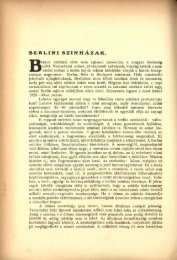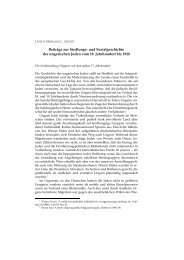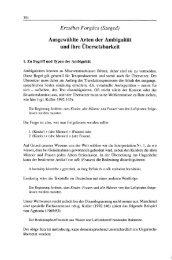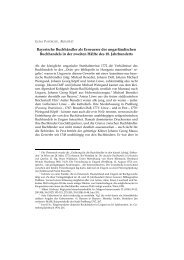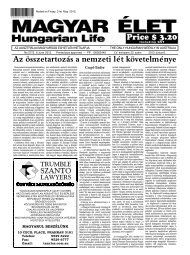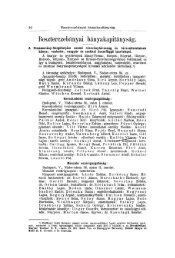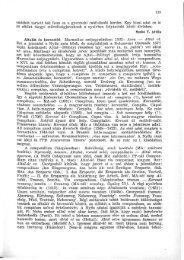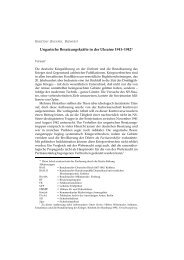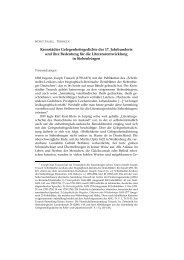NN. 69/70 LUGLIO-AGOSTO/SETTEMBRE-OTTOBRE 2009 - EPA
NN. 69/70 LUGLIO-AGOSTO/SETTEMBRE-OTTOBRE 2009 - EPA
NN. 69/70 LUGLIO-AGOSTO/SETTEMBRE-OTTOBRE 2009 - EPA
You also want an ePaper? Increase the reach of your titles
YUMPU automatically turns print PDFs into web optimized ePapers that Google loves.
the voice-over serve as a window into<br />
the principal character and as<br />
inadvertent self-revelation, Kubrick<br />
uses it for ironic commentary upon the<br />
hero and eighteenth-century<br />
aristocratic society. And this<br />
commentary plays a crucial role in our<br />
experience of the film (Kozloff, 1988:<br />
117)<br />
Allo stesso modo, in Blade Runner lo scarto dalla<br />
struttura narrativa del romanzo è votato alla<br />
realizzazione di valori funzionali specifici attribuiti alla<br />
narrazione VO, quelli indicati ed esaminati nella scorsa<br />
sezione, che non provengono al film dal suo rapporto<br />
con il romanzo-source.<br />
La narrazione VO non è forse, però, del tutto<br />
un’addizione nell’adattamento di elementi estranei al<br />
romanzo. Se è vero che non appare possibile rinvenire<br />
in Do Androids Dream of Electric Sheep? dei riscontri<br />
testuali puntuali, né delle corrispondenze strutturali che<br />
riguardino, ad un più alto livello nella gerarchia<br />
testuale, la voce della narrazione, è possibile ipotizzare<br />
una relazione di tipo traduttivo tra l’elemento della<br />
narrazione VO in Blade Runner e, per utilizzare ancora<br />
le categorie genettiane, il modo del racconto dominante<br />
in esso.<br />
Do Androids Dream of Electric Sheep? è un romanzo il<br />
cui modo narrativo prevalente è quello della<br />
focalizzazione interna variabile. Il narratore<br />
eterodiegetico del romanzo assume prevalentemente il<br />
punto di vista di Deckard e, con minore intensità di<br />
focalizzazione – o, se si vuole, con più frequenti<br />
infrazioni al modo focalizzato, plausibilmente in<br />
connessione con le subnormali facoltà cognitive del<br />
personaggio – e in misura quantitativamente minore<br />
ma non trascurabile, quello di J.R. Isidore. Il romanzo<br />
intero, in effetti, consiste di due distinti fili narrativi che<br />
convergono verso la fine del romanzo al momento<br />
dell’eliminazione da parte di Deckard degli androidi che<br />
si erano nascosti nell’appartamento dello<br />
“speciale”[16]: la storia di Deckard e la storia di Isidore,<br />
ciascuna delle quali viene narrata dal punto di vista del<br />
rispettivo protagonista.<br />
Si consideri, per esempio, nel primo capoverso del<br />
romanzo l’inciso con cui il narratore giustifica la sua<br />
iniziale descrizione dello stato d’animo del protagonista<br />
(“Surprised”) riconducendola immediatamente – a costo<br />
di una intromissione di tipo iterativo in un contesto<br />
testuale a regime singolativo – alle percezioni del<br />
personaggio, “Surprised – it always surprised him to<br />
find himself awake without prior notice –”, o ancora, di<br />
seguito, il dialogo iniziale tra Deckard e la moglie Iran,<br />
nel quale vengono puntualmente riferite dal narratore<br />
le condizioni e le reazioni interiori del primo, ma<br />
soltanto quelle esteriori, reperibili attraverso la<br />
percezione del protagonista, della donna:<br />
Friendlily, because he felt well-disposed<br />
toward the world [...] he patted her<br />
bare, pale shoulder.<br />
“Get your crude cop’s hand away,“ Iran<br />
said.<br />
“I’m not a cop.” He felt irritable, now,<br />
although he hadn’t dialed for it.<br />
“You’re worse,” his wife said, her eyes<br />
still shut. “You’re a murderer hired by<br />
cops.”<br />
“I’ve never killed a human being in my<br />
life.” His irritability had risen now; had<br />
become outright hostility.<br />
Iran said, “Just those poor andys.”<br />
Analogamente a quelle che abbiamo visto essere le<br />
funzioni espletate dagli interventi del narratore VO in<br />
Blade Runner, la narrazione focalizzata nel romanzo è<br />
funzionale alla rappresentazione della realtà interiore<br />
del protagonista, all’espressione dei suoi interessi e<br />
delle sue riflessioni malinconiche e disincantate sulla<br />
vita, su cui sia il libro che il film, fatta salva la differenza<br />
nel ritmo narrativo che distingue i romanzi dai film,<br />
indugiano piuttosto lungamente. Si veda per esempio in<br />
merito il seguente passo tratto dall’inizio del nono<br />
capitolo, in cui sulla narrazione focalizzata (“As he<br />
entered he recognized [...]” “no one appeared to notice<br />
him”) si innesta la trasposizione mimetica del suo<br />
discorso interiore che passa con continuità dall’indiretto<br />
trasposto (“he wondered if Mozart had had [...]”) al<br />
discorso riferito (con passaggio ai tempi del sistema del<br />
presente e alla prima persona singolare: “I have” “can<br />
evade me” “I get” etc.) (cfr. Genette, 1972: 216-232 e<br />
Grosser, 1985: 112-134):<br />
As he entered he recognized The Magic<br />
Flute [...] What a pleasure, he loved<br />
The Magic Flute. He seated himself in a<br />
dress circle seat (no one appeared to<br />
notice him) and made himself<br />
comfortable. Now Papageno in his<br />
fantastic Pelt of bird feathers had<br />
joined Pamina to sing words which<br />
always brought tears to Rick’s eyes,<br />
when and if he happened to think<br />
about it [...] Well, Rick thought, in real<br />
life no such magic bells exist that make<br />
your enemy effortlessly disappear. And<br />
Mozart, not long after writing The<br />
Magic Flute, had died – in his thirties –<br />
of kidney disease. And had been buried<br />
in an unmarked pauper’s grave.<br />
Thinking this, he wondered if Mozart<br />
had had any intuition that the future<br />
did not exist, that he had already used<br />
up his little time. Maybe I have, too,<br />
Rick thought as he watched the<br />
rehearsal move along. This rehearsal<br />
will end, the performance will end, the<br />
singers will die, eventually the last<br />
score of the music will be destroyed in<br />
one way or another; finally the name<br />
“Mozart” will vanish, the dust will have<br />
won. If not on this planet then another.<br />
We can evade it awhile. As the andys<br />
can evade me and exist a finite stretch<br />
longer. But I get them or some other<br />
bounty gets them. In a way, he<br />
realized, I’m part of the form-destrying<br />
process of entropy. The Rosen<br />
OSSERVATORIO LETTERARIO Ferrara e l’Altrove A<strong>NN</strong>O XIII – <strong>NN</strong>. <strong>69</strong>/<strong>70</strong> <strong>LUGLIO</strong>-<strong>AGOSTO</strong>/<strong>SETTEMBRE</strong>-<strong>OTTOBRE</strong> <strong>2009</strong> 71


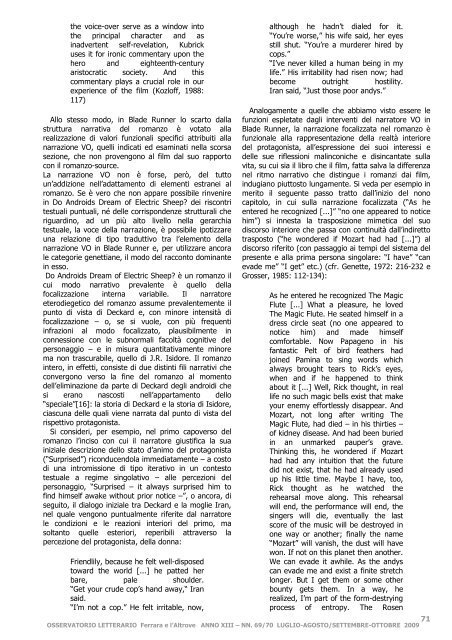
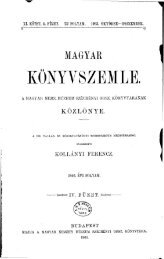
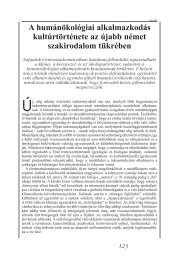

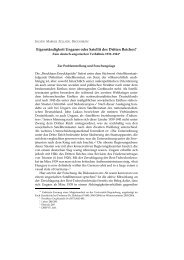
![Letöltés egy fájlban [36.8 MB - PDF] - EPA](https://img.yumpu.com/23369116/1/172x260/letoltes-egy-fajlban-368-mb-pdf-epa.jpg?quality=85)
